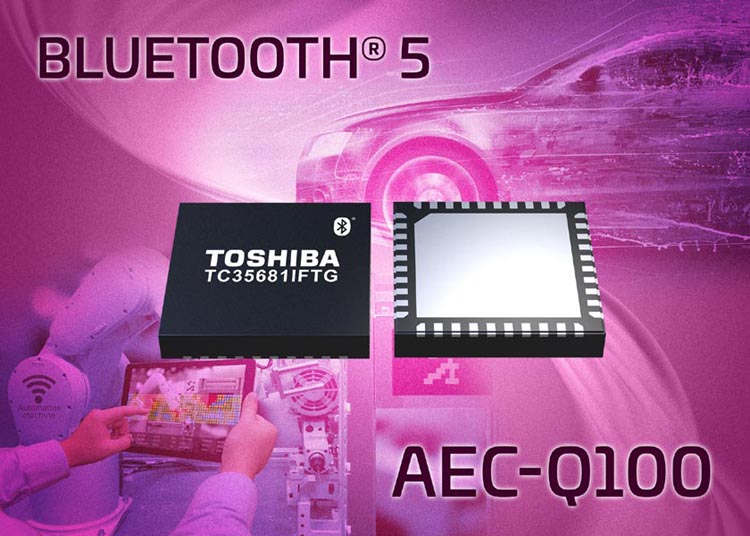Highly expandable and integrated device will be fully AEC-Q100 qualified by spring 2019
Toshiba Electronics Europe has announced a new Bluetooth® IC for automotive applications will be added to their IC line-up. The TC35681IFTG is based on an ARM® Cortex®-M0 CPU and is compliant with Bluetooth® Low Energy (LE) core specification 5.0. It will be used in various automotive applications including Remote Keyless Entry (RKE), On-Board Diagnostics (OBD) and Tire Pressure Monitoring Systems (TPMS), all of which improve comfort and safety.

The mixed-signal device TC35681IFTG contains both analog RF and baseband digital parts to provide a complete solution in a single QFN40 ‘wettable flank’ package measuring just 6.0 mm × 6.0 mm. Designed for compliance with AEC-Q100, the low energy IC is primarily intended to be used in automotive applications. The wettable flank package simplifies automatic visual inspection needed to ensure delivery of the high levels of soldering quality required to withstand vibration experienced in automotive applications.
Alongside basic functions such as Host Control Interface (HCI) profile and GATT profile, new functions as defined by Bluetooth® core specification 5.0 are provided including 2 Mbps data rates, long range and advertising extension functions, all of which are stored in the internal mask ROM. In addition, the TC35681IFTG integrates a high gain power amplifier and realizes +8 dBm for long distance communication.
It is suitable for use in harsh automotive environments due to the wide operating temperature range of –40 °C to +125 °C as well as its high RF transmission power and excellent RF reception sensitivity (the link budget is 113 dB @125 kbps in long range operation). The device operates from a single 1.8 V to 3.6 V supply, drawing just 50 nA in deep sleep mode. An on-chip DC-DC converter adjusts the external voltage supply to the required values. When transmitting, the current draw is only 11.0 mA and this reduces to 5.1 mA when receiving.
The new IC is typically used in combination with an external host processor connected via an HCI. It can also operate in conjunction with an external non-volatile memory, loading the application software into the internal RAM (76 KB) and executing the program using its ARM® Cortex®-M0 CPU.
The TC35681IFTG is able to form an integral part of sophisticated systems due to its 18 General Purpose IO (GPIO) lines and multiple communications options including SPI, I2C and a 921.6 kbps, two-channel UART. The GPIO lines offer access to a range of on-chip features including a wake-up interface, four-channel PWM interface and a 5-channel A/D converter.
